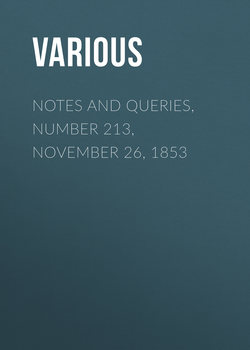Читать книгу Notes and Queries, Number 213, November 26, 1853 - Various - Страница 5
Notes
RAPPING NO NOVELTY
ОглавлениеIt may be interesting to the believers in modern miracles to learn that at all events "rapping" is no new thing. I now send you the account of an incident in the sixteenth century, which bears a strong resemblance to some of those veracious narrations which have enlightened mankind in the nineteenth century.
Rushton Hall, near Kettering in Northamptonshire, was long the residence of the ancient and distinguished family of Treshams. In the reign of Queen Elizabeth, the mansion was occupied by Sir Thomas Tresham, who was a pedant and a fanatic; but who was an important character in his time by reason of his great wealth and powerful connexions. There is a lodge at Rushton, situate about half a mile from the old hall, now in ruins; but covered all over, within and without, with emblems of the Trinity. This lodge is known to have been built by Sir Thomas Tresham; but his precise motive for selecting this mode of illustrating his favourite doctrine was unknown until it appeared from a letter written by himself about the year 1584, and discovered in a bundle of books and papers inclosed, since 1605, in a wall in the old mansion, and brought to light about twenty years ago. The following relation of a "rapping" or "knocking" is extracted from this letter:
"If it be demanded why I labour so much in the Trinity and Passion of Christ to depaint in this chamber, this is the principal instance thereof; That at my last being hither committed1, and I usually having my servants here allowed me, to read nightly an hour to me after supper, it fortuned that Fulcis, my then servant, reading in the Christian Resolution, in the treatise of Proof that there is a God, &c., there was upon a wainscot table at that instant three loud knocks (as if it had been with an iron hammer) given; to the great amazing of me and my two servants, Fulcis and Nilkton."
D. Jardine.
1
This refers to his commitments for recusancy, which had been frequent.
